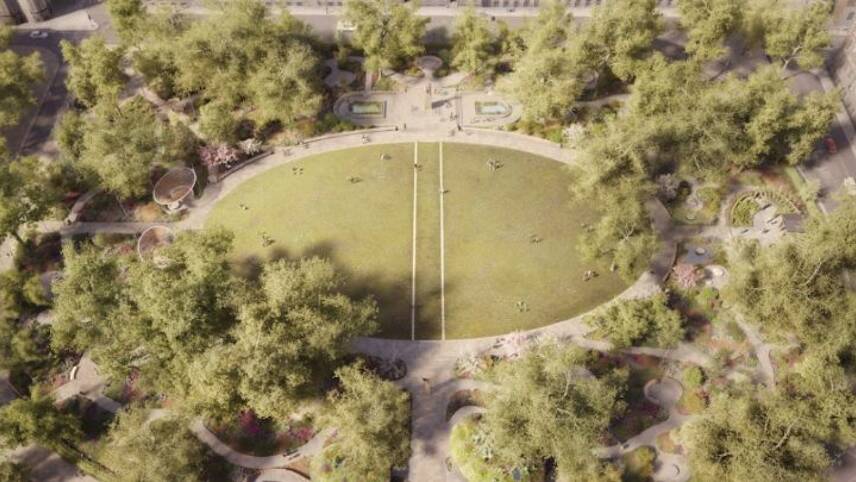Register for free and continue reading
Join our growing army of changemakers and get unlimited access to our premium content

Pictured: An artist's impression of the plans for the Square
The property developer and investor has applied for planning permission from Westminster Council for the redevelopment, with plans developed after a public consultation which attracted more than 3,300 responses published today (15 December).
According to the planning documents, the project should deliver a 15.5% biodiversity net-gain benefit, increasing the number of plant species more than fivefold and the number of individual trees by 35%. 26 new trees are planned and 15 trees will be removed. Trees set to be removed are poor quality, diseased, and/or expected to die within the next ten years.
The plans include a shaded garden, a central open garden, flowering entryways, waterfall canopies and wetlands. There are also plans to install timber pergolas at the entrances, new play spaces, toilets, a kiosk and an education centre, with materials covering topics including the Square’s history and the project’s environmental sustainability credentials.
Grosvenor Britain & Ireland claims that the “significant increase” in planting and “revitalisation” of the soils will increase the Square’s ability to sequester carbon. It will draw up in-depth carbon accounting for the project in the coming months. The garden’s operations will be certified as carbon neutral, as the firm will invest in low-carbon solutions before neutralising residual emissions using offsetting.
Grosvenor Britain & Ireland has also pointed to the project’s ability to improve water management. The plans detail a network of swales across the shaded garden which will catch surface runoff. There will be no need for irrigation.
Architects Tonkin Liu and horticulturalists Nigel Dunnett and Gary Grant supported Grosvenor Britain & Ireland in the development of the new plans. If the planning process runs smoothly, the project could be completed by 2025.
Grosvenor Britain & Ireland’s project director Ed Green said: “Our long-term goal is to be a regenerative, climate-positive business. In its design, delivery and future operation, every aspect of the redesign has considered how we can contribute to this aim.
“With the community, we’ve been able to design a scheme that meets their priorities and can make a significant contribution to local wellbeing, climate resilience and nature.”
Last December, the company outlined plans to become a net-zero business by 2030 and earmarked £90m to retrofit and ‘future proof’ its portfolio of buildings across London. It has also committed to “significant biodiversity net-gain” this decade.
Comments on the planning application can be made on Westminster Council’s planning portal using the reference 21/08289/FULL.
Funding to rewild London
The news from Grosvenor comes shortly after London Mayor Sadiq Khan announced a new £600,000 fund that will support projects to restore wildlife sites and create new habitats.
The funding will support between 20 and 30 projects across the capital, which will work to restore some of the 800 Sites of Importance for Nature Conservation (SINCs) that are not being properly managed in terms of biodiversity conservation. The Mayor’s office will work with the central Government’s Department for Food, the Environment and Rural Affairs (Defra) to deliver the projects.
News outlets including the Guardian are reporting that some of the funding could be used to rewild parts of Hyde Park. The Mayor of London and London Assembly have also flagged the possibility of rewilding Richmond Park, Sydenham Hill Wood and downlands across Croydon and Bromley in South London.
In addition to the £600,000 ‘Rewild London Fund’, £300,000 has been set aside to fund the creation of 40 traineeships for Londoners, so they are ready for work in the nature field. The traineeships are targeted at people aged 16 to 25 from disadvantaged backgrounds, including those with a disability, those from economically deprived areas and ethnic minority youth.
To help involve more people and groups in the fund and the traineeship programme, the Mayor will host a ‘Rewilding Roundtable’ event next year to collect suggestions and innovations that would accelerate London’s work to restore nature.
The £900,000 of funding is new and separate to a £6m ‘Grow Back Greener’ plan for investment in green spaces and climate resilience launched this summer.
Khan said: “The UK is one of the most nature depleted countries in the world. In London, we need to take bold action to ensure that we not only halt the decline of biodiversity in our natural environment but pave the way for growth and change.”
According to recent research from London’s Natural History Museum, the UK has an average of just 53% of its native wildlife intact, putting it in the bottom 10% of the world’s countries.
Alluding to London’s plan to ensure that all residents live within a 10-minute walk of green space, Defra’s Ben Goldsmith added: “All people need experience close connection with nature in their lives, and yet for many Londoners, this is a remote possibility today.
“From green rooftops to pocket parks, nest boxes for peregrines and swifts, rewiggling streams and reintroducing long lost native species, our plan is to weave wild nature back through the very fabric of our city.”
Sarah George


Please login or Register to leave a comment.